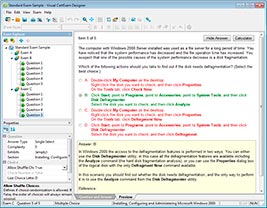Download Java SE 8 Programmer II.1z0-809.Prep4Sure.2018-10-04.52q.tqb
| Vendor: | Oracle |
| Exam Code: | 1z0-809 |
| Exam Name: | Java SE 8 Programmer II |
| Date: | Oct 04, 2018 |
| File Size: | 367 KB |
How to open VCEX files?
Files with VCEX extension can be opened by ProfExam Simulator.
Discount: 20%
Demo Questions
Question 1
Given:
class Bird {
public void fly () { System.out.print(“Can fly”); }
}
class Penguin extends Bird {
public void fly () { System.out.print(“Cannot fly”); }
}
and the code fragment:
class Birdie {
public static void main (String [ ] args) {
fly( ( ) -> new Bird ( ));
fly (Penguin : : new);
}
/* line n1 */
}
Which code fragment, when inserted at line n1, enables the Birdie class to compile?
- static void fly (Consumer<Bird> bird) {bird :: fly ();}
- static void fly (Consumer<? extends Bird> bird) {bird.accept( ) fly ();}
- static void fly (Supplier<Bird> bird) {bird.get( ) fly ();}
- static void fly (Supplier<? extends Bird> bird) {LOST
Correct answer: C
Question 2
Given:
1. abstract class Shape {
2. Shape ( ) { System.out.println (“Shape”); }
3. protected void area ( ) { System.out.println (“Shape”); }
4. }
5.
6. class Square extends Shape {
7. int side;
8. Square int side {
9. /* insert code here */
10. this.side = side;
11. }
12. public void area ( ) { System.out.println (“Square”); }
13. }
14. class Rectangle extends Square {
15. int len, br;
16. Rectangle (int x, int y) {
17. /* insert code here */
18. len = x, br = y;
19. }
20. void area ( ) { System.out.println (“Rectangle”); }
21. }
Which two modifications enable the code to compile?
- At line 1, remove abstract
- At line 9, insert super ( );
- At line 12, remove public
- At line 17, insert super (x);
- At line 17, insert super (); super.side = x;
- At line 20, use public void area ( ) {
Correct answer: DF
Question 3
Given:
public class Foo<K, V> {
private K key;
private V value;
public Foo (K key, V value) (this.key = key; this value = value;)
public static <T> Foo<T, T> twice (T value) (return new Foo<T, T> (value, value); )
public K getKey () (return key;)
public V getValue () (return value;)
}
Which option fails?
- Foo<String, Integer> mark = new Foo<String, Integer> (“Steve”, 100););
- Foo<String, String> pair = Foo.<String>twice (“Hello World!”);
- Foo percentage = new Foo(97, 32);
- Foo<String, String> grade = new Foo <> (“John”, “A”);
Correct answer: C
HOW TO OPEN VCE FILES
Use VCE Exam Simulator to open VCE files

HOW TO OPEN VCEX AND EXAM FILES
Use ProfExam Simulator to open VCEX and EXAM files


ProfExam at a 20% markdown
You have the opportunity to purchase ProfExam at a 20% reduced price
Get Now!



